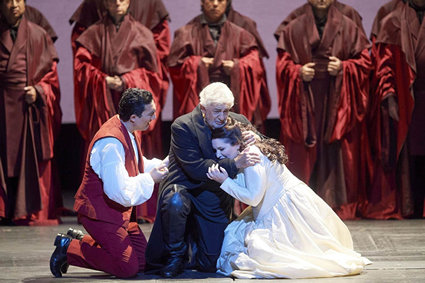| Opera Reviews | 9 May 2024 |
A Simon Boccanegra of mixed fortunesby Moore Parker |
|
| Verdi: Simon Boccanegra
Vienna State Opera 12 September 2020 |
|

Plácido Domingo (Simon Boccanegra), Najmiddin Mavlyanov (Gabriele Adorno), Hibla Gerzmava (Amelia)
|
|
|
Maestro Evelino Pidò proved to be the essential driving force in this revival of Peter Stein’s Simon Boccanegra, which premiered in 2002 and with over 90 performances now to its credit. As Simon, Plácido Domingo returned to a role which was his first baritone part back in 2009. He thereafter performed it here in 2011, and prior to this revival, again most recently on April 1 2019 - marking the 4000 performance of his singing career. Since then, the singer has suffered a Covid-19 infection and is a year and more advanced in age. On this evening the familiar elan and spark that have incredibly shone decade after decade appeared somewhat dimmed in a reading judiciously paced and surprisingly lacklustre - until the opera’s closing scene. A canny performer as both tenor and baritone, Domingo has always known when and where to pull out all the stops, and even in latter years when his resources were no longer powered by youthful virility, sufficient vocal substance could be called upon to be effective throughout an entire evening. In this Boccanegra, the first part of the performance appeared tentative in approach, with only occasional phrases in Simon’s 1st Act exchange with Amelia, and snippets in the all-important “Plebe! patrizi!” scene really reminding of bygone days. In the opera’s finale, Domingo cleverly mustered his all, shaping his final moments with poise and a certain grandeur to close the evening and win familiar accolades from an admiring house. A lack of differentiation between the male voices was more than evident in this line-up - with an ex-tenor singing the baritone lead, a high-lying baritone (almost tenoral in moments) singing Paolo, and a lightweight Fiesco - taking the three lower-lying leads. Fiesco is an interesting challenge - ideally one for a true basso cantante such as bygone legends like Siepi or Rossi-Lemeni - as a vital foil to Boccanegra and one his equal in prowess both vocally and histrionically (a challenge Domingo demonstrated briefly in his Act 3 entrance, “M’ardon le tempia…un atra vampa sento”, which precedes the great finale between Boccanegra and Fiesco). This was Günther Groissböck’s first Jacopo Fiesco - one somewhat cloak and dagger in approach, and appearing to draw more from the German school of Lied than the red blooded essence intrinsic to Italian opera. His instrument lacks the rich depths of a bass - yet neither points toward the gleaming bass-baritone heights of successful predecessors in the part such as Nicolai Ghiaurov or Ruggiero Raimondi. In all, arguably not an optimal choice - at least not at this stage of his career. This was Hibla Gerzmava’s first Amelia in the house. Boasting a voluptuous physique and luscious mid-range, the Abkhazian-Russian soprano enjoyed - indeed carried - a number of the major moments in the work, but is sadly disadvantaged by a register above the stave which tapers rather than blossoms - often to an unpredictable nervous flutter which robs the line of poise and effect. Najmiddin Mavlyanov is a newcomer to Vienna - and something of a “find” for occasions such as this. Currently based in Moscow, he lists a wide repertoire which spans French, Italian and Russian leads - and which even includes Lehar’s Rossillon in Die Lustige Witwe. The Serbian baritone Attila Mokus brings considerable experience in leading parts to his Vienna debut as Paolo. His slender and bright-toned instrument is high-lying and well-projected and his stage portrayal intense, if yet a touch unseasoned. Unquestionably, a promising new member of the State Opera’s ensemble. Familiar to the house; Carlos Osuna’s imposing Captain, and Dan Paul Dumitrescu’s sonorous Pietro - nonchalant and characterful in inimitable understatement. Evelino Pidò - inspired and consistently proficient - led an evening potentially fraught with unpredictability with superb style and elan, while drawing many delightfully subtle surprises from the pit. |
|
| Text ©
Moore Parker Photo © Wiener Staatsoper / Michael Pöhn |
|







